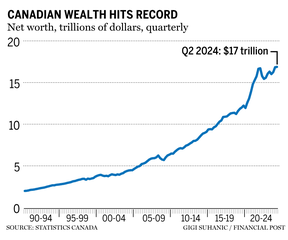Those are the conditions many business leaders are attaching to an improved outlook for 2025
Article content

Lower interest rates and the defeat of Justin Trudeau‘s Liberals: those are the conditions many Canadian CEOs are attaching to an improved business outlook for 2025, according to a new survey.
The inaugural poll by research and leadership company Chief Executive Group LLC said 42 per cent of the 300 Canadian C-suite leaders surveyed expect business conditions to improve 12 months from now as inflation continues to slow and the Bank of Canada carries on implementing interest rate cuts that have already brought rates down to 4.25 per cent from an almost two-decade high of five per cent.
Advertisement 2
Article content
Leaders currently rate business conditions at 5.9 on a scale of one to 10, where one is poor and 10 is excellent, according to the company’s Canadian CEO Confidence Index. Looking to next year, 42 per cent have upgraded their outlook for business conditions to 6.3, while 40 per cent said they expect business conditions to remain the same.
However, central to many leaders’ hopes for improved business conditions is an election to sweep out Trudeau and bring in a new government, one “that many said would hopefully go to a party that can better support businesses,” a company’s news release said.
An federal election in Canada is scheduled to be held by October 2025, at the latest. However, the end of the supply and confidence agreement between the LIberals and the New Democratic Party means one could come sooner.
Despite what many executives perceive as “challenging conditions” for business, 72 per cent said they expect revenue to rise over the next 12 months, while 63 per cent said they are also forecasting high profits.
“When it comes to hiring and deploying cash, however, those numbers drop,” the release said.
Article content
Advertisement 3
Article content
Just under half the executives said they plan to hire more and spend more on capital.
On a sector basis, leaders in forestry and agriculture and financial and professional services have a less optimistic outlook for 2025, with their forecast coming in five per cent below the cross-sector average.
CEOs in those sectors cited concerns ranging from a weak Canadian dollar to uncertainty around the United States presidential election to — again — Trudeau.
“We are losing talent to the U.S.,” the release quoted one CEO as saying. “It takes too long to get things approved in Canada.”
A CEO in finance said, “(The) Liberal government is really harming business. I’m optimistic we’ll have an election before this time next year to help bring things back on track.”
Another CEO was quoted as saying, “Overall, worldwide uncertainty is creeping into the rhetoric.”
Tech CEOs, on the other hand, are more optimistic about business conditions.
“For the past three years, we have observed companies hesitating to make significant decisions due to the recession,” one tech CEO said. “However, we now sense that organizations are eager to digitize and optimize their processes and are ready to move forward.”
Advertisement 4
Article content
On a regional basis, the survey found CEOs in the Prairies are the most optimistic, rating business conditions for next year at 6.52 on the confidence index, up from a current ranking of 6.28, and just ahead of the West and British Columbia at 6.43 — up from 5.84. Ontario and Quebec CEOs were at 6.01 on the index, up from 5.66, while those in the Atlantic provinces dropped their rating for next year to 4.43 from five this year.
Sign up here to get Posthaste delivered straight to your inbox.


Household net worth eclipsed the $17 trillion mark for the first time, with financial assets setting a record high of $10.1 billion in the second quarter, according to Statistics Canada.
The agency’s latest national balance sheet, released Thursday, showed household net worth inched up 0.25 per cent from the first quarter, slower than the previous quarter’s gain of 3.59 per cent.
Carrie Freestone, economist at the Royal Bank of Canada, noted big gains in financial assets in the life insurance and pension category (up 1.22 per cent) and currencies and deposits (up 1.26 per cent) as drivers. — Serah Louis, Financial Post
Advertisement 5
Article content
Read the full story here.

- Today’s data: Statistics Canada will release wholesale sales numbers and the capacity utilization rate



Recommended from Editorial
-

Posthaste: Biggest risk to oil prices might not be what everybody thinks
-

Posthaste: Businesses at greater risk of payment fraud

The rules about contributing to your tax-free savings account are pretty clear, as is the punishment for overcontributing. But as tax expert Jamie Golombek details, some people still haven’t figured it all out and discover that ignorance is no defence when it comes to fighting Canada Revenue Agency fines in court.
Build your wealth
Are you a Canadian millennial (or younger) with a long-term wealth building goal? Do you need help getting there? Drop us a line with your contact info and your goal and you could be featured anonymously in a new column on what it takes to build wealth.
Advertisement 6
Article content
McLister on mortgages
Want to learn more about mortgages? Mortgage strategist Robert McLister’s Financial Post column can help navigate the complex sector, from the latest trends to financing opportunities you won’t want to miss. Read them here
Today’s Posthaste was written by Gigi Suhanic, with additional reporting from Financial Post staff, The Canadian Press and Bloomberg.
Have a story idea, pitch, embargoed report, or a suggestion for this newsletter? Email us at posthaste@postmedia.com.
Bookmark our website and support our journalism: Don’t miss the business news you need to know — add financialpost.com to your bookmarks and sign up for our newsletters here.
Article content
Interest rate cuts, Justin Trudeau key to Canadian CEO outlook
2024-09-13 12:00:28






